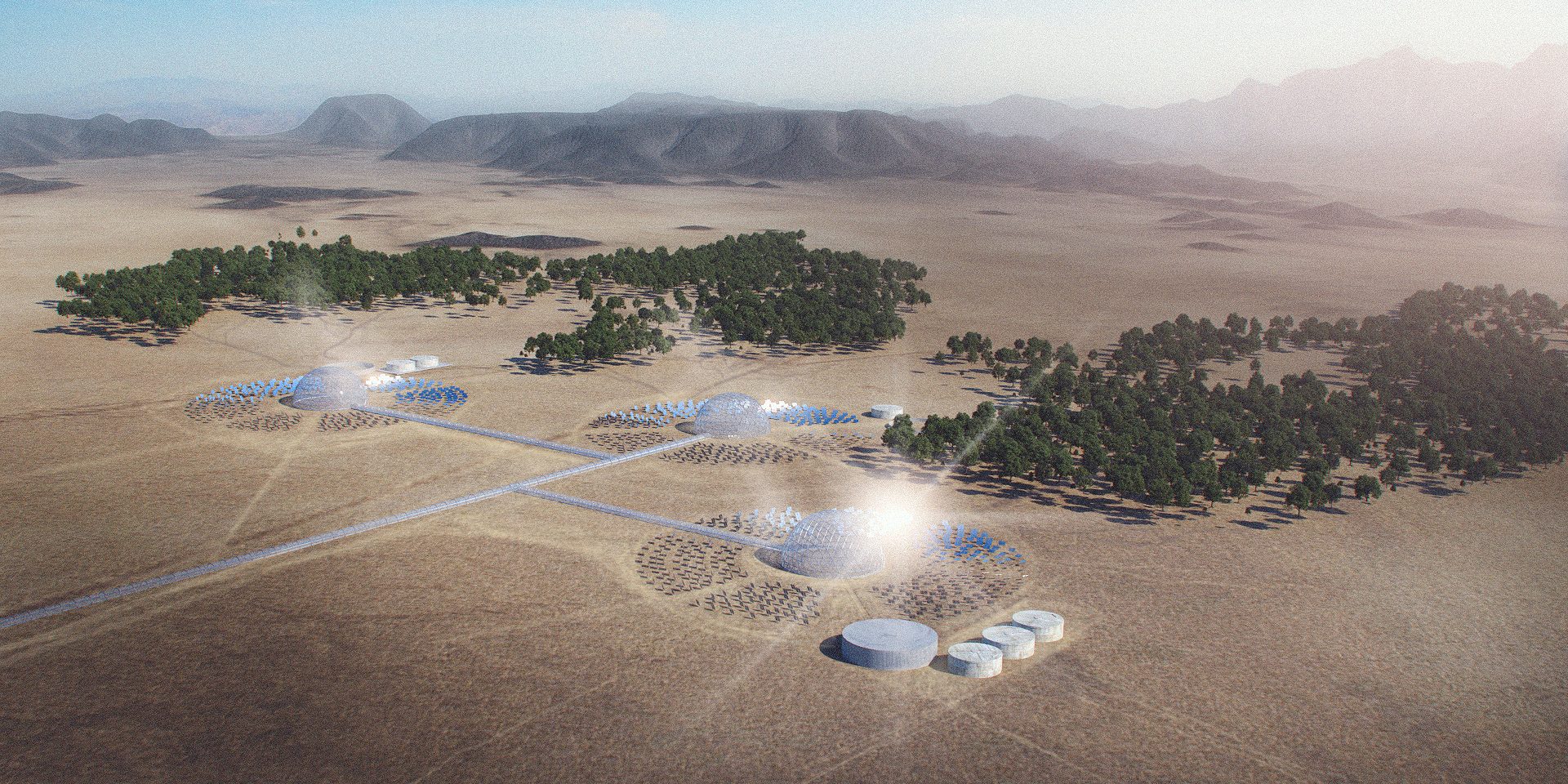
Article by Saudia Arabia 2020 | 2021
Sustainable desalination on a huge scale is critical to the future development of desert regions in the Middle East and the Kingdom of Saudi Arabia (KSA). A young and innovative British company believes it has found the answer, and has already secured a contract to supply its technology to the new city of NEOM. Founder and Chairman Malcolm Aw, explains the story of Solar Water Plc, and how he believes its technology can play a major role in the region’s economic development.
What can your green technologies do for Saudi Arabia?
By the beginning of the next decade those of us who can control, rather than just forecast, the weather will be able to manage cloud distribution, regional precipitation, and with it, vegetation density. We will control the temperature and be able to stop desertification and start reforestation. A green Saudi Arabia will be built on humanity’s greatest resource: imagination. At Solar Water we have an imaginative masterplan, one that is based on the vital provision of water and trees.
How does the Solar Water process work? The Group’s carbon neutral hydro-infrastructure draws seawater inland through glass-enclosed aqueducts to giant domes where it is boiled and distilled through evaporation. The energy generated to superheat the water and create a constant water cycle within the domes is produced by focusing concentrated solar radiation from surrounding reflectors. Solar Water Plc’s
technology could be used to produce clean, cheap water for a range of uses including farming, reforestation, biotech consumption, or use by high-tech industries that rely on pure clean water for their manufacturing.
How do you see your technology meeting desalination needs across KSA?
In order for Saudi Arabia (and the wider MENA region) to become a viable environmentally green commercial proposition, there has to be an abundance of man-made rivers and interconnected canals to create the geographical advantages of a terrain conducive to a productive and profitable habitability specific to that region. New urban developments such as NEOM call for water infrastructure investments that only Solar Water Plc, and its futuristic climate-reversing technologies, can encompass.
How will reforestation transform such an arid part of the world?
Our ability to produce fresh water on a huge scale will allow the creation of the rivers and canals that are essential in opening up desert areas. Such waterways are spheres of economic influence, that give rise to major sustainable urban developments on their banks, some of which may become green capital cities. Good harvests, through massive agro-forestry, means surplus food can be traded, which in turn helps the development of trading centres and allows people to think beyond merely growing food and to turn their attention to ideas and technology.
What is the advantage of your technology over existing desalination systems?
Desalination plants to convert seawater into drinking water and water for agriculture have been used since the 1950s, but at a heavy environmental cost due to its dependence on oil & gas powered plants. It has been estimated that the 30 desalination plants in Saudi Arabia rely on around 300,000 barrels of crude oil each day. Beyond the fuels involved, there are environmental risks presented by massive discharge of brine into the oceans, increasing salinity and destroying marine life. The World Bank has said it is critical that the desalination industry moves away from reliance on fossil fuels.
Is there sufficient desalination capacity to meet forecast requirements?
The current output of desalination plants globally is more than 70 million m3 per day, and growing populations and their demands for higher standards of living mean this figure will need to grow exponentially to meet future needs. In the Middle East and North Africa, the gap between demand for water and actual supply is said to be around 42km3 per year, according to World Bank figures, and expected to increase five-fold by 2050.
What is the company’s background?
I have enjoyed a long career as an inventor and entrepreneur in many countries and developed the Solar WaterTM dome and founded Solar Water Plc in 2016, with the aim of making a real impact in the world through the provision of fresh water in areas needing it the most. Since starting the company I have been joined by a great Solar Water team, such as David Reavley our CEO, Jan Pilkington-Miksa CCO, Beata Dreger-Smith Director of Business Administration and PR, Prof. Chris Sansom, Liam Koh and Dr Xavier Tonnellier. We all share the same passion and vision to help solve chronic water shortages by harnessing solar power to produce inexhaustible supplies of fresh water in an environmentally friendly way.
Who are Solar Water’s partners and supporters? I am delighted to say that Solar Water Plc has three key partnerships to support its development. The first of these is with Cranfield University, which is acknowledged to be the leading UK organisation conducting research and development in Concentrating Solar Power (CSP). Our second is with British Water, the trade association for British water companies and organisations, and our third is with the Department for International Trade (DIT), the UK Government department responsible for striking and extending trade agreements.
In addition to these partnerships, the company has received funding from the EU’s Horizon 2020 research and innovation programme, for a
NEW URBAN DEVELOPMENTS SUCH AS NEOM CALL FOR WATER INFRASTRUCTURE INVESTMENTS THAT ONLY SOLAR WATER PLC, AND ITS FUTURISTIC CLIMATE-REVERSING TECHNOLOGIES, CAN ENCOMPASS.
project to develop a prototype seawater desalination dome. It has also received an official pledge of support from the United Nations Educational, Scientific and Cultural Organisation (UNESCO) for the development work it is undertaking in trying to solve the world’s fresh water shortage.
What is your experience to date in Saudi Arabia?
In March 2019, Solar Water Plc took part in a Renewable Energy Trade Mission to Saudi Arabia. CEO, David Reavley, supported by the British Embassy and the DIT, presented the Solar WaterTM solution during a business roundtable at the Council of Saudi Chambers, as well as at a networking reception at the British Embassy attended by key business and governmental stakeholders. This mission was an exciting opportunity, because the development of renewables and improving energy efficiency is a key part of the Vision 2030 agenda.
Could you explain your first contract in Saudi Arabia?
On 30 January 2020, NEOM announced that it has chosen Solar Water Plc to build its first ever ‘solar dome’ desalination plant. Solar Water Plc’s technology will help the new city of NEOM, located in northwest Saudi Arabia, work towards one of its aims of revolutionising the process of water desalination, so solving one of the world’s most pressing problems, namely access to fresh water. We see this desalination project serving as a test case for other water scarce countries that are struggling to generate environmentally safe and sustainable sources of fresh water.
How will your technology be used at NEOM?
Desalination of seawater from the Red Sea will be the major source of water supply, using our solar-enhanced greenhouse technology. Concentrated solar energy from a neighbouring field of large mirrors that concentrate the sunlight to speed up the natural process of evaporation within the domed greenhouse structures, which can be up to 80m in diameter and made up of a heat-conductive steel structure.
Seawater enters the dome either by gravity or pump. It then evaporates, while distillation takes place in a separate unit adjacent to the dome. Once the process is complete, the freshwater is piped by gravity flow into a system of reservoirs, at which point it can be directed to meet local needs. It might go to municipal water utilities or everglades of agricultural wetlands. In principle, it can be used as part of a process to reverse desertification, using imported top soils for reforestation of the desert.
You then secured a second contract in the Middle East?
Yes, two weeks after the announcement of our NEOM contract we were proud to announce that Jordan Phosphate Mines Company (JPMC) has chosen Solar Water Plc to supply freshwater to its phosphates plant on the Gulf of Aqaba. For the next 25 years, freshwater will be supplied by a 40m Solar Waterdesalinator dome, positioned adjacent to the JPMC plant. Work on the project has begun and we expect the desalinator to begin supplying freshwater by mid-2021.














